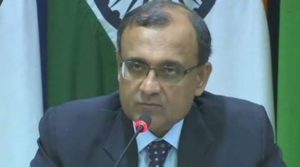India to chair UNSC’s crucial Taliban and Libya sanctions committees, panel on counter-terrorism
UN Ambassador T S Tirumurti will chair the CTC in 2022, the year in which India will commemorate the 75th anniversary of its independence

By PTI
India will chair the crucial Taliban and Libya sanctions committees and the Counter-Terrorism Committee of the UN Security Council during its tenure as non-permanent member of the powerful 15-nation UN body. India, which has been at the forefront of the years-long efforts to reform the UNSC, began its two-year tenure at the Council on Friday last.
“The UN Security Council establishes subsidiary bodies on specific issues, including on the sanctions regimes. I’m happy to announce that India has been asked to chair three important committees of the Security Council, which include the Taliban Sanctions Committee, Counter-Terrorism Committee (CTC) and the Libyan Sanctions Committee, India’s Permanent Representative to the UN Ambassador T S Tirumurti said in a video message on Thursday.

Tirumurti said the Taliban Sanctions Committee, also known as the 1988 Sanctions Committee, has always been a “high priority” for India, keeping in mind the country’s strong interest and commitment to peace, security, development and progress of Afghanistan. “Our chairing this committee at this juncture will help keep the focus on the presence of terrorists and their sponsors threatening the peace process in Afghanistan. It has been our view that peace process and violence cannot go hand in hand,” he said.
Tirumurti will chair the CTC in 2022, the year in which India will commemorate the 75th anniversary of its independence. “India will also chair the Counter-Terrorism Committee in 2022, which coincides with the 75th anniversary of India’s independence. The chairing of this committee has a special resonance for India, which has not only been in the forefront of fighting terrorism, especially cross-border terrorism, but has also been one of its biggest victims,” he said.
Tirumurti said the Libya Sanctions Committee, also called the 1970 Sanctions Committee, is a “very important” subsidiary body of the Council, which implements the sanctions regime, including a two-way arms embargo on Libya and assets freeze, a travel ban and measures on illicit export of petroleum. “We will be assuming the chair of this committee at a critical juncture, when there is international focus on Libya and on the peace process,” he said.
The three committees are highly significant subsidiary bodies of the UNSC and India chairing them is a ringing endorsement of the country’s leadership to steer the panels. India is a leading voice at the UN in the fight against the global scourge of terrorism, particularly the threat posed in the region by cross-border terrorism emanating from Pakistan. India has underscored that the fight against terrorism will be a key priority for it as it sits at the UN high-table for the 2021-22 term.
Prime Minister Narendra Modi had said as a Council member, India will not hesitate to raise its voice against the enemies of humanity, including terrorism and will always speak in support of peace, security and prosperity. Former Indian Ambassador to the UN, Hardeep Singh Puri, had chaired the CTC for the term 2011-12 when India was last in the UNSC as the non-permanent member.
The CTC, established in the wake of the 9/11 terror attack in the US, works to bolster the ability of UN member states to prevent terrorist acts both within their borders and across regions. It is assisted by the Counter-Terrorism Committee Executive Directorate (CTED), which carries out the policy decisions of the body, conducts expert assessments of each member state and facilitates counter-terrorism technical assistance to countries.
Tirumurti thanked Permanent Representative of St Vincent and the Grenadines Ambassador Rhonda King, who, as the chair of the informal Working Group on Security Council Working Methods, had steered this process to its logical conclusion. The 1988 Sanctions Committee relating to Taliban oversees the sanctions measures imposed by the Security Council. Individuals and entities are designated on the 1988 Sanctions List as individuals, groups, undertakings and entities associated with the Taliban in constituting a threat to the peace, stability and security of Afghanistan.
The committee designates individuals and entities for participating in the financing, planning, facilitating, preparing or perpetrating of acts; supplying, selling or transferring arms; recruiting and supporting acts or activities of groups, undertakings and entities associated with the Taliban. The listed entities and individuals are subject to an assets freeze, travel ban and arms embargo.
Under the Libya Sanctions Committee, all member states are required to prevent the sale or supply of arms and related material to Libya; prevent the entry into or transit through their territories of all listed individuals; freeze all funds, other financial assets and economic resources that are owned or controlled, directly or indirectly, by the listed individuals or entities.
The Flag State of a designated vessel is required to direct the vessel not to load, transport, or discharge petroleum, including crude oil and refined petroleum products, from Libya, among other measures.
In 2021, India, Norway, Kenya, Ireland and Mexico join non-permanent members Estonia, Niger, Saint Vincent and the Grenadines, Tunisia and Vietnam and the five permanent members China, France, Russia, UK and the US in the Council. It is the eighth time that the country has had a seat on the powerful horseshoe table.